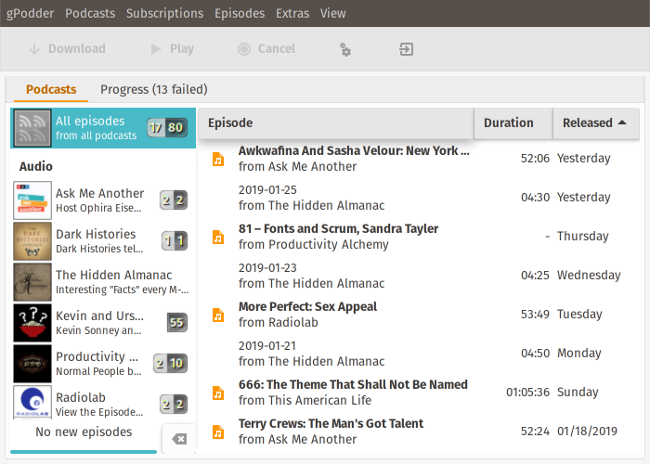

- #GPODDER DEPENDENCIES HOW TO#
- #GPODDER DEPENDENCIES INSTALL#
- #GPODDER DEPENDENCIES UPDATE#
- #GPODDER DEPENDENCIES UPGRADE#
In addition to the user-specific API endpoints, a public (non-authenticated) API is provided for searching podcasts and retrieving the podcast toplist from the server. The mygpoclient library allows developers to utilize a Pythonic interface to the web services (formerly known as my.). Sudo apt-get -y autoremove -purge python3-mygpoclient Extra info and code examples Sudo apt-get -y purge python3-mygpoclient Remove mygpo-simple-client completely (configurations, data and all of itsĪnd lastly, you can run the next command to remove absolutely everythingĮ.g.: configurations, data and all of its dependencies. To remove mygpo-simple-client configuration and dataįrom your system you can run the following purge command: Sudo apt-get -y autoremove python3-mygpoclient Remove mygpo-simple-client with all configurations and data That are no longer needed by Ubuntu 22.04, you can use the command below: To uninstall mygpo-simple-client and its dependencies Sudo apt-get remove python3-mygpoclient Uninstall mygpo-simple-client and all its dependencies To uninstall only the mygpo-simple-client package you can execute
#GPODDER DEPENDENCIES UPGRADE#
This will upgrade the package even if is already installed.
#GPODDER DEPENDENCIES INSTALL#
It's Good to Know: sudo apt-get install python3-mygpoclient Package if it doesn't exist you may leave out -only-upgrade part. Note that this command will not install any new packages! If you wish to install the Sudo apt-get -only-upgrade install python3-mygpoclient If you want to add unit tests for a specific module (ex: gpodder. You should use the following format with the apt-get command/apt command: For example, the doctests in src/gpodder/util.py are added as 'util' (the 'gpodder' prefix must not be specified there). Next, to upgrade only the mygpo-simple-client, e.g.
#GPODDER DEPENDENCIES UPDATE#
Package mygpo-simple-client using apt-get?įirst, you will need to update packages index.
#GPODDER DEPENDENCIES HOW TO#
Sudo aptitude -y install python3-mygpoclient How to upgrade (update) a single You can install mygpo-simple-client by running the following command: Update apt database with aptitude using the following command. If you want to follow this method, you might need to install aptitude first sinceĪptitude is usually not installed by default on Ubuntu 22.04. Sudo apt -y install python3-mygpoclient Install mygpo-simple-client using aptitude To begin, update apt database with apt using the following command. It is possible to install it from these repositories using the apt packaging system.

Sudo apt -y install python3-mygpoclient Install mygpo-simple-client using aptīecause mygpo-simple-client is available in Ubuntu 22.04’s default You can install mygpo-simple-client using apt by running the Install mygpo-simple-client using apt-getįirst, update apt database with apt-get using the following command. You can choose one of them or refer to the recommended one. GPodder now works without keymap errors that were occurring on some of my feeds.In the following sections, we will describe each method in detail. I uninstalled python-feedparser breaking the gpodder dependency, downloaded feedparser-5.0.1.tar.gz from feedparser-5.0.1.tar.gz - feedparser - feedparser-5.0.1.tar.gz - Universal Feed Parser - Google Project Hosting This solution worked for me on Open Suse 11.4 My podcast podcast updated and I was able to download new episodes.


(Sigh, maybe I will switch to Unbunto.)Īnyway, I downloaded feedparser-5.0.1.tar.gz and installed that. Python(abi) = 2.6 is needed by python-feedparser-4.1-5.1.noarch Python = 2.6 is needed by python-feedparser-4.1-5.1.noarch # rpm -install -force python-feedparser-4.1-5.1.noarch.rpm Python-feedparser-4.1-5.1.noarch.rpm but was unable to force installing it: Maybe that correlates to something, but it doesn't fit the versioning you describe.Īnyway I uninstalled this python-feedparser via YaST2 (forcing break dependencies). The python-feedparser that openSuSE 11.4 installs is called Thanks, Richard (and Thomas on the gPodder list).


 0 kommentar(er)
0 kommentar(er)
